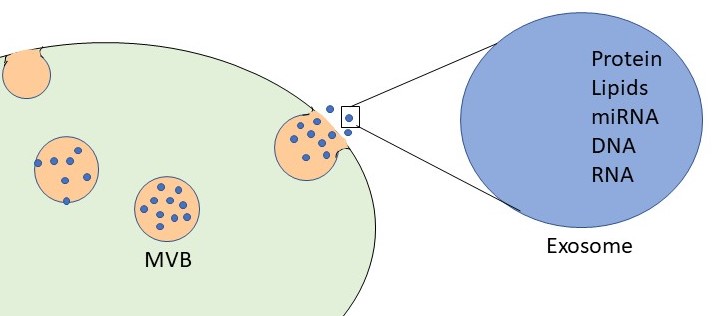
en.wikipedia.org
Exosomes contain various molecular constituents of their cell of origin,
including proteins and RNA. Although the exosomal protein composition varies with the cell and tissue of origin, most exosomes contain an evolutionarily-conserved common set of protein molecules. The protein content of a single exosome, given certain assumptions of protein size and configuration, and packing parameters, can be about 20,000 molecules.
[14] T
he cargo of mRNA and miRNA in exosomes was first discovered at the University of Gothenburg in Sweden.
[15] In that study, the differences in cellular and exosomal
mRNA and
miRNA content was described, as well as the functionality of the exosomal
mRNA cargo. Exosomes have also been shown to carry double-stranded DNA.
Exosomes can transfer molecules from one cell to another via membrane vesicle trafficking, thereby influencing the immune system, such as dendritic cells and B cells, and may play a functional role in mediating adaptive immune responses to pathogens and tumors.
[17][18] Therefore, scientists that are actively researching the role that exosomes may play in cell-to-cell signaling, often hypothesize that
delivery of their cargo RNA molecules can explain biological effects. For example,
mRNA in exosomes has been suggested to affect protein production in the recipient cell.[15][19][20] However, another study has suggested that miRNAs in exosomes secreted by mesenchymal stem cells (MSC) are predominantly pre- and not mature miRNAs.
[21] Because the authors of this study did not find
RNA-induced silencing complex-associated proteins in these exosomes, they suggested that only the pre-miRNAs but not the mature miRNAs in MSC exosomes have the potential to be biologically active in the recipient cells.
Multiple mechanisms have been reported to be involved in loading miRNAs into exosomes, including specific motifs in the miRNA sequences, interactions with lncRNAs localized to the exosomes, interactions with RBPs, and post-translational modifications of Ago.
[22]
Conversely, exosome production and content may be influenced by molecular signals received by the cell of origin. As evidence for this hypothesis, tumor cells exposed to hypoxia secrete exosomes with enhanced angiogenic and metastatic potential, suggesting that tumor cells adapt to a hypoxic microenvironment by secreting exosomes to stimulate angiogenesis or facilitate metastasis to more favorable environment.
[23]




